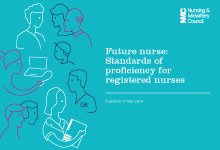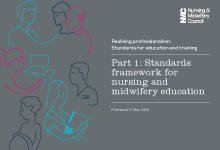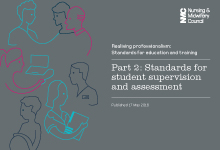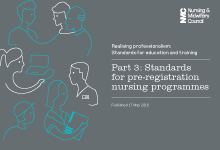Welcome to the Nursing Practice Modules:
Year 1 NPR1031P Module Specifications
The purpose of this module is to provide the essential clinical learning and simulation and practice experiences a student requires to achieve the NMC proficiences, enabling progression through to the 2nd part of the programme.
Through their electronic portfolio (Pebblepad), signed by their practice supervisor and practice assessor, and moderated by the academic assessor, students will demonstrate achievement of the skills and professional behaviours identified at the first progression point by the Nursing and Midwifery Council. During clinical learning all students will be required to undertake clinical skills via a range of simulation techniques to meet the Achievement of Proficiency in the PAD. These will be signed off by the Module Team/Practice Assessor.
INDICATIVE CONTENT:
The student nurse will demonstrate the ability to participate in providing and evaluating person-centered care in a variety of settings, including clinical learning and simulation alongside their own personal and professional development.
The indicative content mirrors the 7 platforms of the NMC and includes Annexe A and B as evidenced in the practice assessment document:-Being an accountable professional, Promoting health and preventing ill health, Assessing needs and planning care, Providing and evaluating care, Leading and managing nursing care and working in teams, Improving safety and quality of care, Coordinating care and Annexe A and B
LEARNING OUTCOMES:
| Module Learning Outcomes |
| On successful completion of the module, with detailed guidance students will be able to: |
| Subject-Specific Knowledge, Understanding & Application |
| a) Demonstrate an understanding of and work competently within legal, professional and ethical frameworks |
| b) Use appropriate communication strategies and technological solutions, while recognising the individuality of service users, within a person centred care framework |
| c) Contribute to and implement care to meet the essential needs of service users using under pinning knowledge |
| d) Work as part of a team and with the support of others understand the rationale underpinning service provision and care delivery |
| e) Meet NMC Assessment of Proficiencies expected for Part 1 within the Practice Assessment Document. |
| Employability & Changemaker Skills |
| f) Review own strengths and weaknesses, and regularly monitor learning progress through portfolio |
| g) Identify problems and the process of escalation within the practice setting |
| h) Present their own objectives and plan how to achieve them in the practice setting |
Year 2 NPR2074P Module Specifications
The purpose of this module is to provide the essential clinical learning and simulation and practice experiences students require to achieve the set of NMC proficiencies enabling progression through to the 3rd part of the programme. Through the electronic portfolio (Pebblepad), signed by their practice supervisor and practice assessor, and moderated by the academic assessor, students will demonstrate achievement of the skills and professional behaviours, relevent to chosen field of nursing, identified at the second progression point by the Nursing and midwifery council. During clinical learning all students will be required to undertake clinical skills via a range of simulation techniques to meet the Achievement of Proficiency in the PAD. These will be signed off by the Module Team/Practice Assessor.
INDICATIVE CONTENT:
The student nurse will demonstrate the ability to initiate and evaluate person centered care in a variety of settings, including clinical learning and simulation, alongside their own personal and professional development. The indicative content mirrors the seven platforms of the NMC and includes Annex A and B as evidenced in the practice assessment document (PAD): Being an accountable professional, Promoting health and preventing ill health, Assessing needs and planning care, Providing and evaluating care, Leading and managing nursing care and working in teams, Improving safety and quality of care, Coordinating care and Annex A and B
LEARNING OUTCOMES:
| Module Learning Outcomes |
| On successful completion of the module, with guidance students will be able to: |
| Subject-Specific Knowledge, Understanding & Application |
| a) Practice responsibly and with accountability within a framework of legal, professional and ethical values |
| b) Utilise an enhanced level of communication,interpersonal skills and technological solutions, when working with service users, carers and professionals |
| c) Confidently apply evidence based decision making to meet the essential and complex holistic health needs of service users |
| d) Recognise and critically apply theories of leadership, management, change and teamworking in a range of situations |
| e) Meet the NMC assessment of proficiences expected for part two within the practice assessment document |
| Employability & Changemaker Skills |
| f) Initiate and present knowledge, ideas and viewpoints to a variety of audiences |
|
g) Identify problems and to distinguish between concepts, principles and techniques to help generate solutions and choices |
| h) Contribute to the decision making process following careful evaluation of options |
Year 3 NPR3038P / 3039P / 3040P / 3041P
MODULE OVERVIEW:
The purpose of this module is to provide the essential clinical learning through simulation and practice experiences nursing students require to achieve completion of the set of NMC proficiencies enabling registration. Through the electronic portfolio (Pebblepad), signed by their practice supervisor and practice assessor, and moderated by the academic assessor, adult nursing students will demonstrate achievement of the skills and professional behaviours identified by the Nursing and midwifery council. During clinical learning all students will be required to undertake clinical skills via a range of simulation techniques to meet the Achievement of Proficiency in the PAD. These will be signed off by the Module Team/Practice Assessor.
INDICATIVE CONTENT:
The student nurse will demonstrate the ability to manage and lead person centered care in a variety of settings, including clinical learning, simulation, alongside their own personal and professional development.
The indicative content mirrors the seven platforms of the NMC and includes Annex A and B as evidenced in the practice assessment document (PAD). Being an accountable professional, Promoting health and preventing ill health, Assessing needs and planning care,Providing and evaluating care, Leading and managing nursing care and working in teams, Improving safety and quality of care, Coordinating care, Annex A and B.
| Module Learning Outcomes |
| On successful completion of the module, with guidance students will be able to: |
| Subject-Specific Knowledge, Understanding & Application |
| a) Practice autonomously, responsibly and accountably within a framework of legal, professional and ethical values |
| b) Utilise advanced levels of communication, interpersonal skills and technological solutions, when working with service users, carers and professionals |
| c) Evaluate evidence based decision making to meet the essential and complex holistic health needs of service users |
| d) Work collaboratively and apply theories of leadership, management, change and teamworking in a range of situations |
| e) Meet the NMC assessment of proficiences expected at part three within the practice assessment document |
| Employability & Changemaker Skills |
| f) Express, dicsuss and present knowledge, ideas and viewpoints to a variety of audiences with confidence and clarity |
|
g) Identify problems and apply concepts, principles and techniques to generate solutions, choose between alternatives and take appropriate action |
| h) Make, justify and implement decisions following careful evaluation of options |
These modules provide the essential practice experiences that students are required to achieve, which incorporate the Nursing and Midwifery Council (NMC) generic and field specific outcomes to enable their successful progression through to the 2nd and 3rd year of the programme.
The student will be expected to actively participate in a full range of practice learning opportunities without risk to the public, guided by their practice assessor and supervisors while developing their ability to engage in the delivery of essential skills. The Nursing and Midwifery Council identified skills and professional behaviours that a student must demonstrate.
Please refer to the following Standards:
Standards of proficiency for registered nurses (NMC 2018): https://www.nmc.org.uk/standards/standards-for-nurses/standards-of-proficiency-for-registered-nurses/

Standards framework for nursing and midwifery education (NMC 2018): https://www.nmc.org.uk/standards-for-education-and-training/standards-framework-for-nursing-and-midwifery-education/

Standards for student supervision and assessment (NMC 2018): https://www.nmc.org.uk/standards-for-education-and-training/standards-for-student-supervision-and-assessment/

Standards for pre-registration nursing programmes (NMC 2018): https://www.nmc.org.uk/standards/standards-for-nurses/standards-for-pre-registration-nursing-programmes/

Students within all fields of nursing are utilising an electronic system called Pebblepad.
General information about Pebblepad can be accessed using the following link https://mypad.northampton.ac.uk/pebblepad/students/ Students and mentors will be able to access the portfolio using their log in details.
The assessment of practice is an important part of your course assessment because it is your way of demonstrating that you are developing the practical skills required to be registered nurses. The assessments will provide the evidence that you are fit for registration with the Nursing and Midwifery Council.
Assessment of Practice constitutes 50% of course assessment and it is therefore essential that you achieve a ‘pass’ in the first year and ‘pass grade’ in all of its elements.
If you do not pass the assessment of practice for year 1, 2, 3, this will constitute a ‘referral in practice’.
If you are referred twice in practice it will constitute a ‘fail in practice’ and may mean that you will be discontinued from the programme.
Therefore, successful completion of this aspect of your programme is vital to your progression and the ultimate goal of registering with the Nursing and Midwifery Council.
You are strongly advised to become familiar with the document entitled “guidance on professional conduct for nursing and midwifery students” (NMC, 2011). This will put this practice document into context and demonstrate its importance to you. This document can be obtained via:
